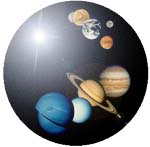Has the origin of the solar system been determined?

The planets in our solar system are said to have originated either from the sun (fission), independent of the sun (capture), or along with the sun (nebula, accretion). Since these same three ideas also arise in current origin theories for the moon, the problems mentioned in that answer also apply to the solar system.
One version of the fission theory states that the sun was once sideswiped by another passing star and that huge portions of matter were torn loose from the sun and eventually coalesced into the present planets. However, a passing star could not easily provide the angular motion or momentum that the solar system possesses.
Capture of planet material by the sun is a theory even less acceptable than fission. Gas clouds are present in space, but one can hardly imagine their capture by the sun's gravity. Most space clouds are very remote; they are isolated from stars by many light-years.
Nebular formation of the planets requires the contraction of a gas cloud due to gravity, and the sun and planets then condense from the swirling cloud. There are two major problems with this idea. First, like a spinning ice skater who pulls her arms inward, contracting gas would have spun the sun up to a very rapid rotation. However, the actual rotation of the sun is much too slow to support this theory. The sun possesses only 2 percent of the solar system's circular motion or angular momentum.
Gas clouds in space are generally observed to either spread out or to remain constant in size, not to contract. For a typical cloud, outward gas forces are much stronger than the inward pull of gravity.
Since every secular origin theory for the solar system begins with preexisting matter, none is really an origin theory at all! Aside from accepting supernatural creation from nothing (John 1:3; Col. 1:16-17), science must begin with material from an unknown source. Science alone will never have final answers regarding the true origin and purpose of the solar system.
Only in Christ the Creator “are hidden all the treasures of wisdom and knowledge…” (Col. 2:3). This does not mean that we must abandon our search for scientific knowledge. It does mean that we must maintain a posture of reverence and spiritual humility in this search. After all, it is God's universe, and it reflects his attributes of perfect power, wisdom, and love.
Author: Dr. Donald B. DeYoung - adapted from Astronomy and the Bible: Questions and Answers, 2nd Edition (Grand Rapids, Michigan: Baker Books, 2000), 176 pp.
Copyright © 2000, Films for Christ, All Rights Reserved—except as noted on attached “Usage and Copyright” page that grants ChristianAnswers.Net users generous rights for putting this page to work in their homes, personal witnessing, churches and schools.